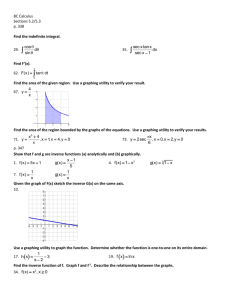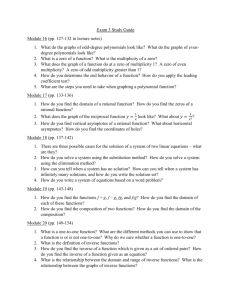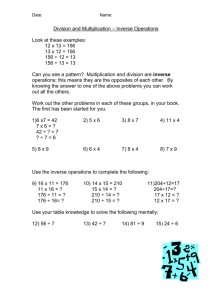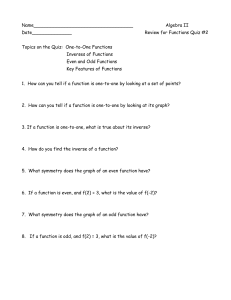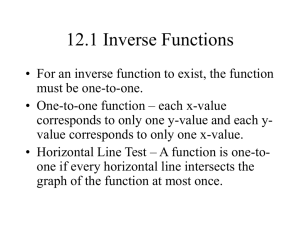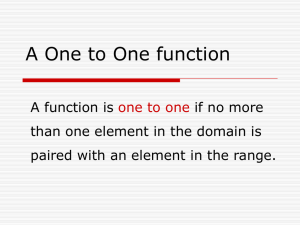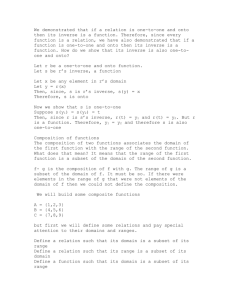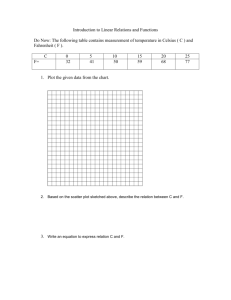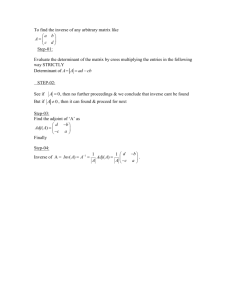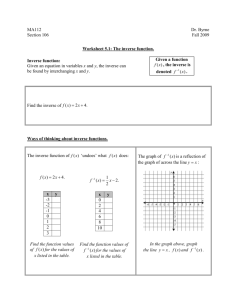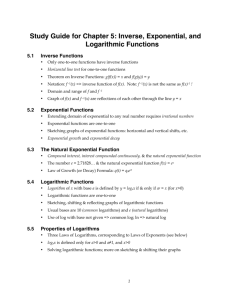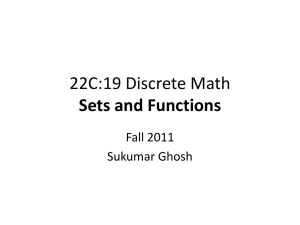Exponential and Logarithmic Functions
advertisement
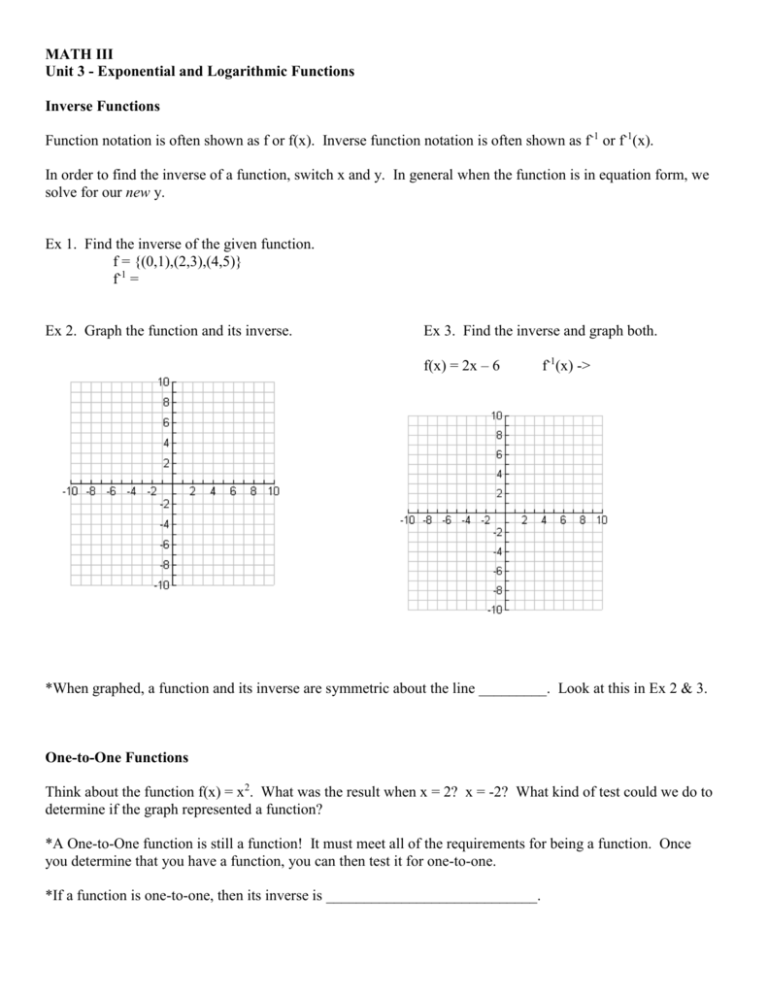
MATH III
Unit 3 - Exponential and Logarithmic Functions
Inverse Functions
Function notation is often shown as f or f(x). Inverse function notation is often shown as f-1 or f-1(x).
In order to find the inverse of a function, switch x and y. In general when the function is in equation form, we
solve for our new y.
Ex 1. Find the inverse of the given function.
f = {(0,1),(2,3),(4,5)}
f-1 =
Ex 2. Graph the function and its inverse.
Ex 3. Find the inverse and graph both.
f(x) = 2x – 6
f-1(x) ->
*When graphed, a function and its inverse are symmetric about the line _________. Look at this in Ex 2 & 3.
One-to-One Functions
Think about the function f(x) = x2. What was the result when x = 2? x = -2? What kind of test could we do to
determine if the graph represented a function?
*A One-to-One function is still a function! It must meet all of the requirements for being a function. Once
you determine that you have a function, you can then test it for one-to-one.
*If a function is one-to-one, then its inverse is ____________________________.
Ex 5. Determine if the function is one-to-one. Find the inverses of the one-to-one functions.
B. g(x) x 3 1
A. f(x) = 5x + 8
C. h(x)
x2
x3
D. m(x) 2x 2 x 1
Exponential Functions and Graphs
An exponential function is in the form of f(x) = ax where x is a real #, a > 0, and a 1.
Ex 1. Graph y = 2x, y = 3x, and y = 4x.
1 x
1 x
1 x
Ex 2. Graph y , y , and y .
2
3
4
Generalizations?
Generalizations?
What is the number "e?"
Ex 3. Graph y = ex.
What should this graph look like?
Ex 4. Graph y = 2x, y = 2x – 1, and y = 2x + 3.
What should these graphs look like?
Logarithmic Functions and Graphs
Ex 1. Graph y = 2x and x = 2y.
Compare the graphs. What do you notice?
Use the procedure given previously to find the inverse of y = 2x. (switch x and y; solve for y).
Logarithmic Notation: a y x y log a x where x > 0 and a is a positive constant and a 1.
Ex 2. Find each:
A. log 5 125
Special Rules:
B. log1061
C. log1111
log a a
log a 1
D. log 49 7
for any log base a.
Ex 3. Convert the exponentials to logarithms and the logarithms to exponentials.
A. log10
B. log 2 32 x
C. e t 7
0.01 2
Ex 4. Use your calculator to find the following:
log 10
ln 100
log 100
ln e
log 29
ln 1
log –3
ln –5
Change of Base Formula – in order to use your calculator, you MUST be using base e or base 10!! So, if you
have a base other than one of these, we can change the base to e or 10 using this formula.
log b M
log a M
log a b
Ex 5. Use the change of base formula to find the following:
A. log 5 125
B. log 5 8
Ex 6. Use the change of base formula to graph y log 2 x
Properties of Logarithms
Remember the following exponent rules:
a m a n a m n
am
a mn
n
a
a
m n
a m n
We can show why these work using specific examples. For example, show that a 2 a 3 a 23 a 5
The properties of logarithms are very similar because they are related! We can prove these.
log a MN log a M log a N
log a
M
log a M log a N
N
log a M p p log a M
Proofs: Let log a M x and log a N y, so that a x M and a y N.
x
M a
MN a x a y
N ay
M p a x
p
Applications of the properties:
log 100 =
log 10 =
log 1000 =
Ex 1. Expand the following using the properties.
A. log 5 10 8
7
2
log a x 3 y 5
E. log a
C. log 2 4 3
D.
B. log 7
x6
z
F. log b
bx 2
y 5z 8
1
Ex 2. Rewrite as a single logarithm: log x 3log y log z
2
Other rules:
log a a x
a loga x x
Ex 3. Simplify:
A.
5
log 7 7
B. ln e3
D. e ln 3
Ex 4. Given log b 2 0.693; log b 3 1.099; and log b 5 1.609. Find approximate values of the following.
A. log b 125
C. 5 log5 m
B. log b
Proof of Change of Base Formula:
Let x = log b M so that b x M.
5
3
C. log b 30
D. log b
1
6
Solving for Exponential and Logarithmic Equations
Ex 1. 2 x 32
Ex 2. 2 3x2 16
Ex5. 4 x 2 6 x
Ex 4. e 4 t 242
Ex 7. log x log x 3 1
Ex 6. log 5 x 2
Ex 8. log 3 2x 1 log 3 x 4 2
Ex 3. 2 x 33
Ex 9. ln 4 x 6 ln x 5 ln x
